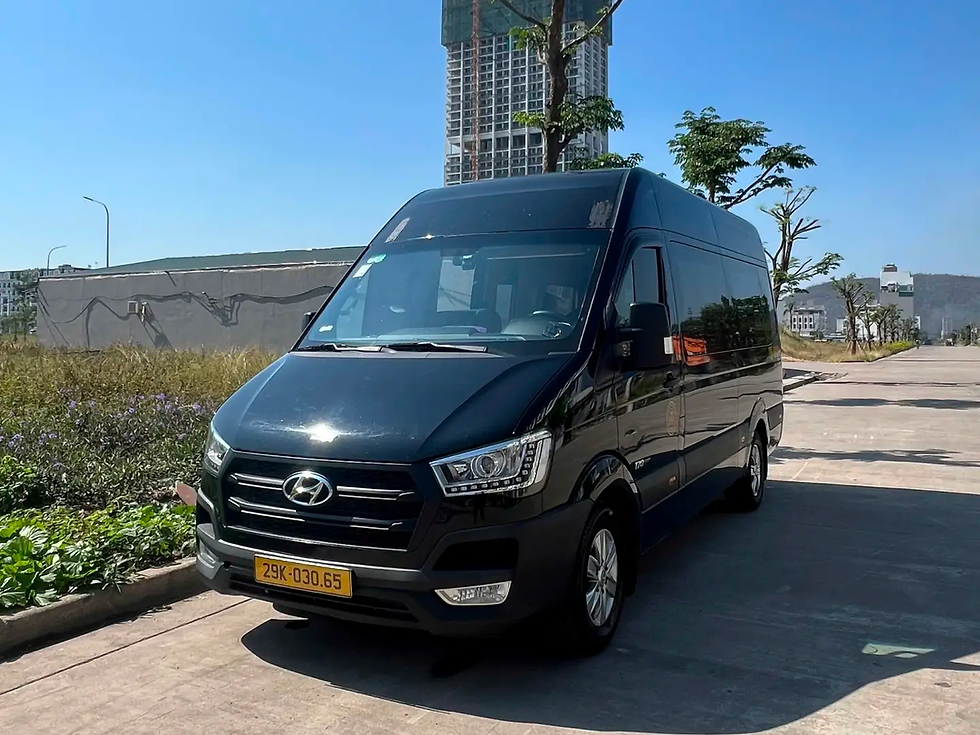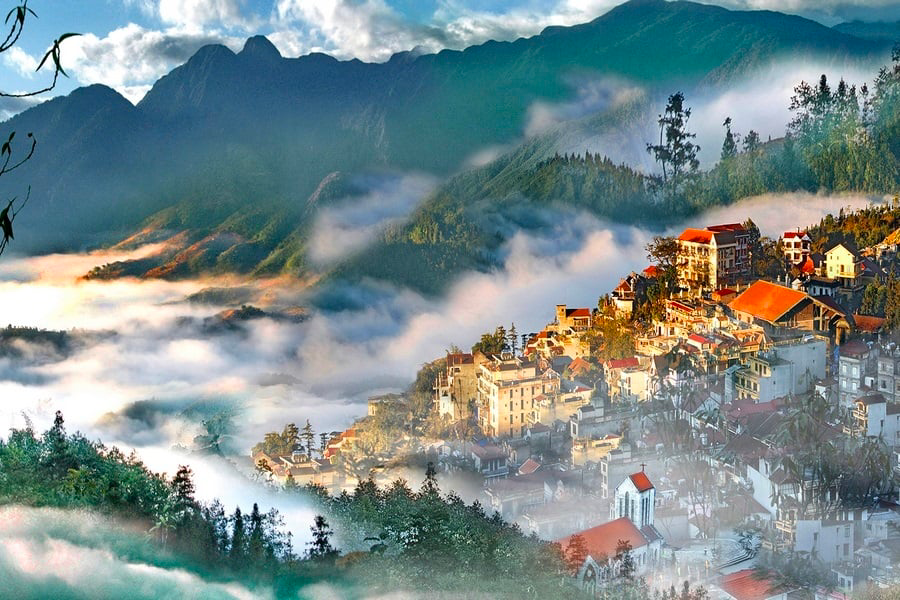How to get to Sapa from Ha Long Bay: 3 best ways for you to choose.
- Smiley Phuong

- Oct 23, 2025
- 6 min read
Updated: Oct 31, 2025
Connecting the emerald waters of Halong Bay with the majestic terraced mountains of Sapa is a popular yet complex journey for many travelers. The primary question is how to effectively travel from Halong Bay to Sapa, with common concerns about the distance and lack of direct train routes. This guide provides a detailed, practical analysis of the three best transport methods: bus, private car, and train - comparing their cost, time, and convenience to help you plan with confidence.

By bus
Distance & waiting time
The bus journey covers a distance of approximately 350-400 km. The total travel time is typically 8 to 10 hours. Most bus companies operate one or two departures per day, almost always in the evening (e.g., 6:00 PM - 8:00 PM). This timing allows travelers to maximize their last day in Halong Bay and arrive in Sapa the following morning.

Price
This is the most budget-friendly option. A one-way ticket on a sleeper bus generally costs between $20 and $30 USD (500,000 - 750,000 VND) per person. Travelers may want to opt for a "VIP" or "cabin" bus if available. These buses offer small private pods instead of just a reclining seat, providing significantly more comfort and privacy for the long journey.
Advantage + Disadvantage
The sleeper bus is an efficient choice, but it is important to know what to expect.
Advantages | Disadvantages |
Most Direct Route: This is the only option that takes you from Halong to Sapa without any transfers. | Long Journey: 8-10 hours on a bus can be tiring for some. |
Budget-Friendly: It is by far the cheapest way to travel between these two points. | Varying Comfort: Standard sleeper seats can be cramped, especially for taller travelers (over 6ft / 183cm). |
Saves on Accommodation: By traveling overnight, you save the cost of one night's hotel room. | Winding Roads: The final 1-2 hours of the journey involves climbing mountain roads to Sapa, which can be difficult for those prone to motion sickness. |
By personal car
Distance & waiting time
A private car follows the same 350-400 km route as the bus but completes it much faster. You can expect a total travel time of just 6 to 7 hours, making it the quickest option available.
There is no "waiting time." The service is entirely on your schedule. The driver will pick you up directly from your Halong Bay hotel or cruise pier at the exact time you designate and take you directly to your hotel in Sapa.

Price
This is the most expensive option, but it can be economical for small groups or families. A private 4-seater car will typically cost between $150 and $200 USD (3,700,000 - 4,900,000 VND) for the one-way trip. A larger 7-seater or minivan will be closer to $200 - $250 USD.
The price is for the entire vehicle, not per person. When split between 3-4 people, it becomes much more reasonable for the level of convenience provided.
Advantage + Disadvantage
Travelers who choose a private car often value the seamless, door-to-door experience above all else.
Advantages | Disadvantages |
Fastest Option: At 6-7 hours, it cuts the journey time significantly. | Most Expensive: This is the premium option, especially for solo travelers or couples. |
Maximum Comfort & Privacy: You have the entire vehicle to yourself and your group. | Daytime Travel: Most people take a private car during the day, which "uses" a full day of your itinerary for transit. |
Total Flexibility: You can leave at any time of day and ask the driver to stop for photos, food, or restroom breaks whenever you wish. | |
Door-to-Door Service: No need to handle luggage or find taxis at either end. |
By train
Distance & waiting time
This is a two-part journey:
Leg 1: Halong Bay to Hanoi. This is a 3-4 hour bus or private car ride.
Leg 2: Hanoi to Lao Cai. The overnight train takes about 8-9 hours, typically departing between 9:00 PM and 10:00 PM.
The total travel time is high, easily 12-15 hours or more, including the layover in Hanoi. You will likely have several hours to wait in Hanoi between your arrival from Halong and your train's departure.

Price
The price is the combined cost of both legs:
Bus to Hanoi: $10 - $15 USD
Train to Lao Cai: $30 - $60 USD per person for a soft-sleeper berth in a 4-person cabin.
Luxury tourist carriages (like Chapa Express or Sapaly) are attached to the main train and offer more comfort and amenities at a higher price. The total cost is often $40 - $75+ per person.
Advantage + Disadvantage
It is important to note that this route is not direct. However, the layover in Hanoi can actually be a bonus if you plan for it.
Advantages | Disadvantages |
Comfortable & Scenic: The train offers a flat bed in a private cabin, which is generally comfortable. | Slowest & Most Complex: This is the longest option and requires multiple transfers and handling your luggage. |
Bonus Time in Hanoi: The layover allows you to spend an afternoon or evening in Hanoi. You can store your luggage and explore the Old Quarter or enjoy a pho. | Not Direct: You must transit through Hanoi, which adds significant time. |
Needs extra transportation: The train arrives in Lao Cai (not Sapa) around 5:00-6:00 AM. You then need a 45-minute transfer up the mountain to Sapa. |
Comparison
Choosing the best way to get from Halong Bay to Sapa depends entirely on your priorities: cost, speed, or experience.
Method | Total Time (Approx.) | Avg. Cost (Per Person) | Comfort | Convenience |
Sleeper Bus | 8-10 hours | $ ($20 - $30) | Medium | High (Direct) |
Private Car | 6-7 hours | $$$ ($50 - $150) | High | Highest (Door-to-door) |
Train (via Hanoi) | 12-15+ hours | $$ ($40 - $75+) | High | Low (Multiple transfers) |
Tips for a smoother journey
Here are a few essential tips for this route:
Book in Advance: Whichever option you choose, book your tickets or car at least a few days in advance. During peak season (September-November and March-May), these routes sell out quickly.
Prepare for Motion Sickness: The final hour of every route—the drive from Lao Cai station (for the train) or the highway (for bus/car) up to Sapa—is on a steep, winding mountain road. If you are prone to motion sickness, take medication beforehand.
Manage Early Arrivals: Both the sleeper bus and the train arrive in Sapa or Lao Cai very early (5:00 - 6:00 AM). Most hotels will not allow you to check in until the afternoon.
Luggage Handling: Pack as light as you can. Sleeper buses have luggage holds, but space inside train cabins is limited. Hauling large suitcases through multiple transfers for the train journey can be exhausting.

What to do on the way from Ha Long to Sapa?
Because most journeys are overnight, the opportunities for sightseeing during the trip are limited. However, the beginning and end of the journey offer some beautiful sights.
Scenery to look out for
If you take a private car during the day, you will witness a remarkable change in landscape. You will leave the coastal plains of Quang Ninh, cut across the vast, flat rice paddies of the Red River Delta, and finally climb into the lush foothills and dramatic peaks of the Northwest.
For the bus and train routes, the best view comes at the very end. The 45-minute drive from Lao Cai up to Sapa at dawn is truly magical. As you climb, you'll see the fog-filled valleys below and get your first stunning glimpses of the iconic rice terraces.

Things to do on the way to Sapa
Since the bus and train routes are long, overnight journeys, the main activity will simply be resting. This is a good time to read a book, listen to music or podcasts, or edit travel photos. Travelers can also use the time to plan their Sapa itinerary, such as booking a trekking tour or researching restaurants. Don't forget a travel pillow and earplugs to make the journey more comfortable.
Conclusion
Traveling from the limestone karsts of Halong Bay to the rice terraces of Sapa is a journey between two essential Vietnamese destinations. While the bus is direct and budget-friendly, a private car offers speed, and the train provides a classic experience. Choosing the right path depends on your personal travel priorities. Feel free to contact us for expert help in planning this leg or integrating it into a complete, smooth, and unforgettable Vietnam itinerary.
Find out other travel options to get to Sapa



Comments